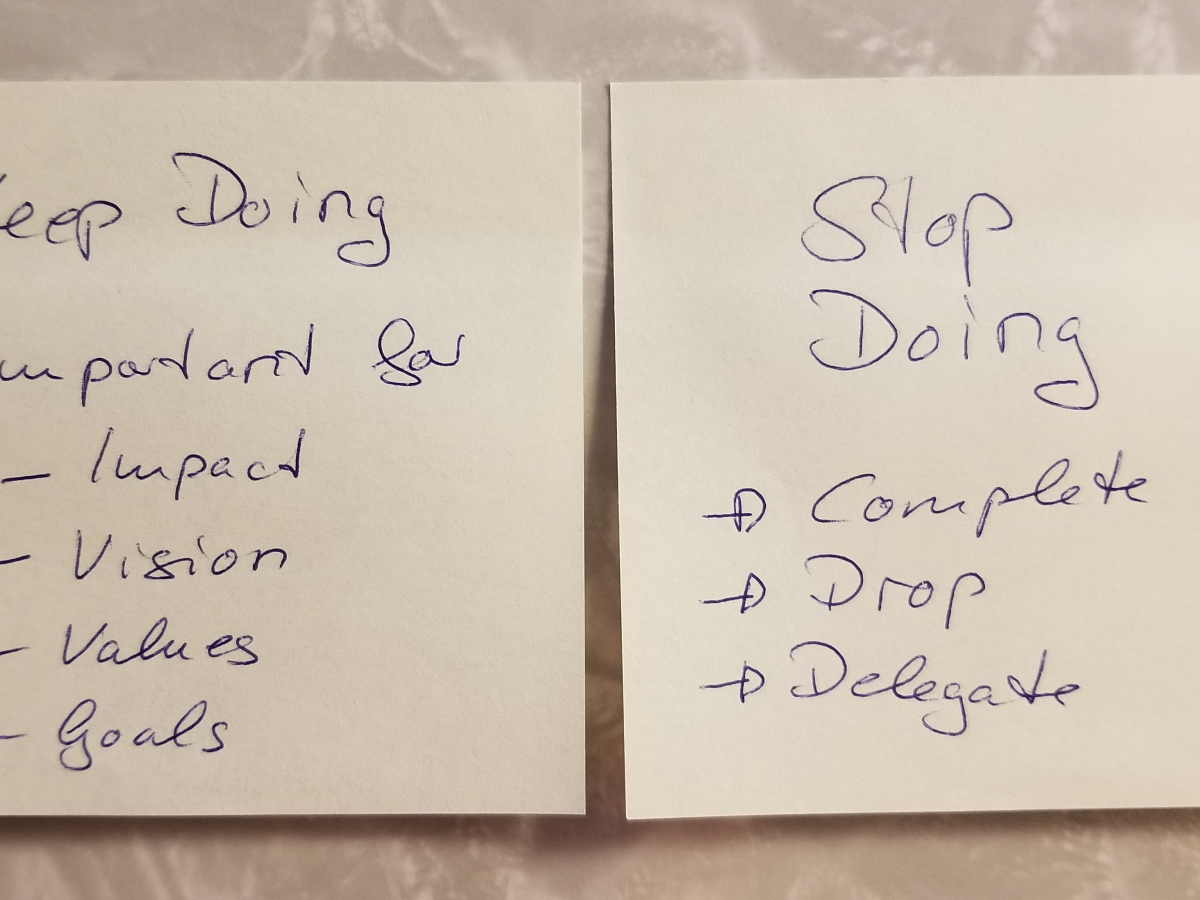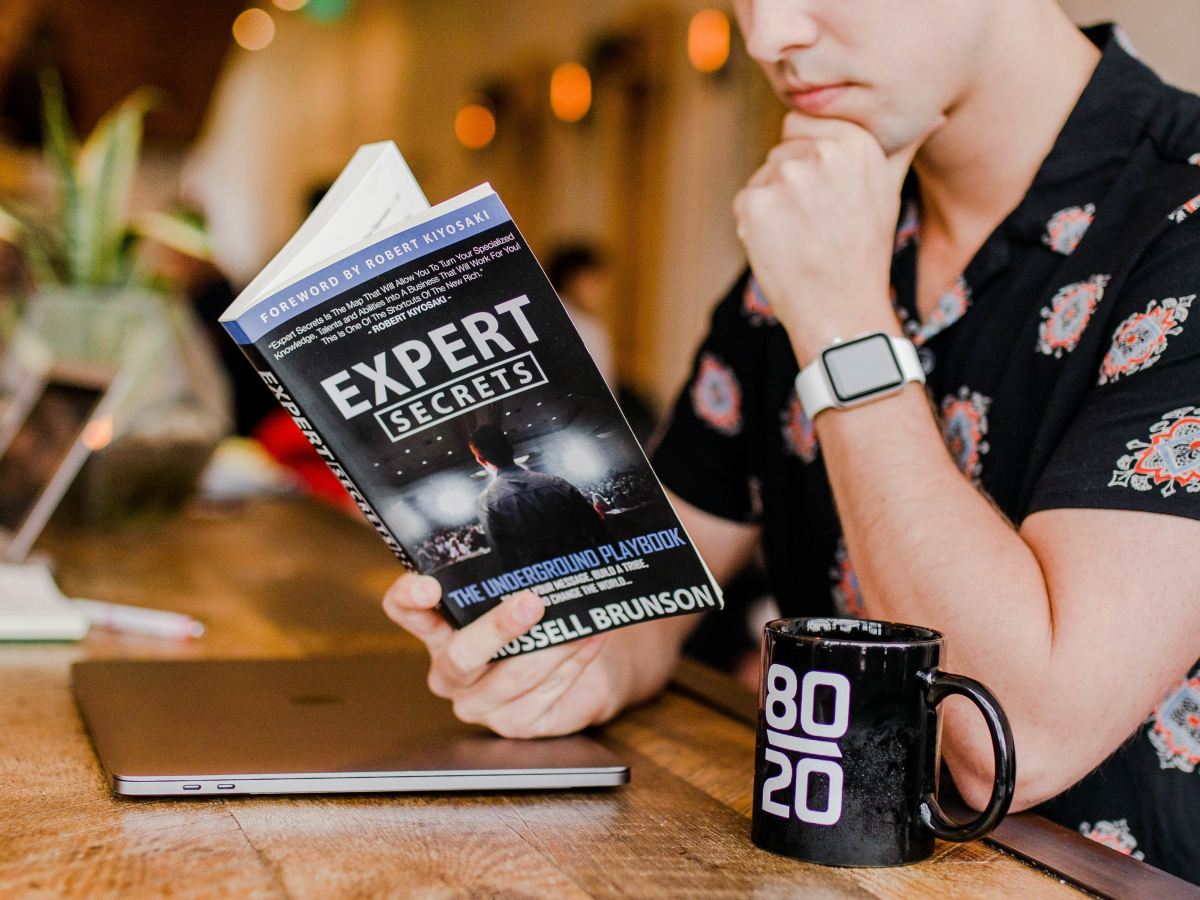We would all love it, if we could simply be great at product, or at leadership, or at public speaking, or an expert on AI, or great at discovering and phrasing vision and strategy or super focused or finally find a healthy work-life balance. We admire those people who have mastered a skill we’d like to have, especially when they’re writing books, podcasting, consulting or speaking about their powerful skill. And yet: none of them were born having already mastered those skills. It likely took them years to develop that skill, it probably meant failing a lot and then showing up for it anyway. To truly master something most likely means spending those famous 10,000 hours on it.
So how did any expert or master at something start? Very simply put: With their first steps in that direction. Maybe playfully, maybe accidental, maybe inspired by somebody or something, but what they all have in common: They took that first step and then many subsequent ones. They also probably failed a lot initially. But that’s not what we see when we look at them delivering a keynote or appearing in a famous podcast today.
What I keep hearing when interviewing product leaders about their career, is a theme around “I wish I had focused more time on my personal growth sooner”. Or “I wish I had invested in a coach / consultant / mentor sooner”. Or “I wish I had known and prepared for how different it is to be a product leader from being an individual contributor in a product team”. If you can relate to this, then this blog post is for you!
I’ll cover some aspects of how you can make 2024 the year where you start intentionally and successfully investing in your own growth! And at the bottom of this post sits an invitation for a delicious, mischievous, fun and creative way to take that first step for investing in your own personal growth.
The “identity trick”
Before we’re comfortable to say that we’re good at something, we have to feel confident with it. Debbie Milman (who started a podcast on Design 18! years ago, long before podcasting was even a word most people understood) defines confidence as “the successful repetition of any endeavor”. What does this have to do with identity, you may ask?
Luckily our mind can be a formidable help in getting us closer to who we want to be. We can envision a future identity for ourselves that is already successful at the thing we want to master. If I want to e.g. role model and embody a continued focus on learning and growth in my team, I can imagine already having a learning mindset and culture in my team. And then ask myself: What would people in that culture actually do? This allows us to identify and start forming the habits of an individual or a team that’s “mastering growth”. It likely means that they regularly make time for learning, because that is a priority for them. It likely also means they have a healthy and supportive failure culture, etc… You can basically envision already having the skill, and then reverse engineer how you get to that place of mastery so you can choose to take your first step.
The “structure learning time trick”
Right now (if you’re reading this as I publish this post towards the end of January), is where a lot of good intentions from the start of the year face their slow death against the pressures of your other everyday habits. Let’s say you want to learn more about the use of AI in product in 2024. If you don’t actually get started, and if you don’t keep learning, it will likely not become that new successful skill you can confidently add to your resume. In other words, if you don’t regularly make time for learning and practicing the skill you want to learn, it almost certainly won’t happen on its own.
Be smart and use your calendar for this. Commit to a specific time of day and frequency and ideally be quite specific what you want to do in those times that you block for yourself. This could e.g. be that you block off 30 minutes each morning for listening to a podcast, reading relevant blogs, finding a webinar to listen to or actually hands on do something to get better at your desired skill.
Keep checking your time commitment. If you don’t actually show up for your own learning slots, find ways to stop doing something else so you can make the time. (You can check my previous blog post about how to bring things to completion for tips on how to identify what to stop doing). Remember that “identity trick”? Right, an AI expert has probably spent a ton of time doing AI related things. Why not open ChatGPT and get started learning by doing? Or start following leaders in the field and read what they are posting about. Or choose to be part of this delicious, mischievous, fun and creative gathering you’ll find at the bottom of this post…
The “accountability trick”
If you’re like me, putting stuff in my own calendar while not really having any hard deadlines or urgencies around your own growth, might not be enough to truly commit to something. But what works really well for me is to tell somebody else about my commitment and then promise them an update in regular intervals. Of course they can’t force me to actually do anything, but putting that little bit of friction (in the form of embarrassment when I have to report that I did not stick to my own goals) is often motivation enough for me to actually get started.
Find a peer, ideally in that field you both want to grow in, and set up a checkin call for the purpose of accountability and growth. Or – if you have the budget – invest in a coach to identify your growth areas and keep feeling accountable for your own development in that direction. Ask if your company has budget for this and make use of it if the answer is yes. This might work even better if you pay for a coach yourself, you’d feel awful “wasting the money on coaching” and not actually following through on the commitments you made for yourself as part of a coaching session. It’s a way to create “skin in the game” for yourself in devoting both time as well as resources to focus on your growth.
If journaling works for you, this might be your own accountability structure hack. Reflect on the question of “What do I truly want to learn and focus on this week?” and commit your own action items to yourself in writing. Then look back at the end of the week to figure out how you did. I found that the simple act of writing an intention down helped me feel more committed to it.
The “celebration trick”
Whatever skill you want to seriously learn, deepen or master is likely not going to materialize with just 1-2 hours of your time and a couple of repetitions in doing it. It’s much more likely going to take a regular time and focus, and your learning goal will take a while to achieve. Think about ways how you can celebrate progress along the way, making your learning journey more fun, and creating moments of joy in celebrating your progress towards your goal.
You might be able to break your learning into chunks, define what those milestones are and treat yourself with a mini-celebration once they are reached. This could be around a certain learning goal, having done something necessary as a building block, or simply celebrating the completion of 10 (or 20, 50, 100) hours of regular committed learning time.
Coming back to the previous point, your accountability partner will be an excellent celebration buddy for reaching those goals along the way. Also celebrate the fuckups of you actually trying the new thing and failing. Most things we eventually become great at, we also failed at a lot. The trick is to reflect on the learnings, making them explicit, then trying again and figuring out a way around that obstacle.
The “I really love it trick”
Be honest with yourself: Things you actually enjoy doing feel much easier to find the time for. So make use of this for yourself. It is absolutely allowed to follow your interests and desires in picking the thing you want to learn and get great at. I’m not saying there won’t be discomfort and failure when you first start doing something, but if you’re genuinely interested in figuring something out or learning about something, it will feel more fun along the way and your motivation to stick to it will be greater.
Coming back to Debbi Milman (that pioneering podcaster): She was genuinely interested in talking to people about design. So she started her own audio interview format as a way to do something she actually loved doing. Were her first few podcast episodes delivered as confident and well produced as her current ones? Absolutely not, but she kept doing it, kept improving it, and keeps loving it to this day. (There is a great podcast where she shares her story of becoming an award-winning podcast host with Brene Brown if you’d like to hear more about that!)
Maybe there is a happy “yes and” with the thing you want to master and something else you truly enjoy. If you are like me, you might e.g. love the company of smart people and learning with and from them (rather than doing it alone). Then why not join a masterclass on the topic you’re interested in? Or find ways to learn the new thing in a playful way? You might ask yourself: what would make it more fun for me to learn something new? What would make it attractive, inviting and delicious to get started?
Introducing: Product Salon
I mentioned at the top of this post, that I’m doing a research project with product leaders right now. One of the questions I’m asking all my interviewees is “What advice do you have for yourself if you could travel back in time and set yourself up for success as a product leader?”. I keep hearing “I wish I had spent more time on my own personal growth.” Or “I wish I had known XYZ earlier in my career”. This inspired me to take the topics you mention into a new kind of product gathering:
The format will be a blend of a masterclass on product leadership with an artsy salon. Think Gertude Stein and the salon she hosted where artists like Picasso, Hemenway, Fitzgerald and Matisse gathered and met. Don’t worry, you obviously won’t need to be famous or super artistic to be a part of it, just imagine you could mingle in that kind of an atmosphere and space. A playful space, that feels welcoming, safe and inclusive. A space that is elevating your product leadership skills while you’re having fun. Imagine a space where you have permission to be weird, curious and playful with kind, generous and collaborative people. A space to mischievously try stuff, fail safely, laugh about it and learn. A space that that feels delicious and exciting, fun, and yes, a tad bit weird. Just weird enough to stretch your imagination and make you step outside your normal patterns into learning something new.
I’d love to see you in the first Product Salon. It will be about the topic of learning, mastery and personal growth. As a practical focus we’ll take a look at learning about AI as a tool in product. Yes, there will be an opportunity to find learning and accountability buddies. Yes, you’ll have a chance to nominate your desired learning topics for future gatherings. Yes, we’ll play with ways to use that identity trick. And everyone in the space will add their unique way to be awesome to the group. The date is February 7th 2024 at 6pm CET (noon EST) for an hour.
If this speaks to you, send me a message to sign up. Let’s make 2024 the year where you not just talk about personal growth as a thing you want to focus on, but the thing you actually do!
Wishing you all a beautiful start to 2024! Let’s learn and grow together.
Image: created with Midjourney (and I’m happy to share the prompt when we play with this in my Product Salon on Feb 7th)
___________________________
If you would like to make 2024 the year you start stepping into your personal growth goals: reach out for a free coaching chemistry session with me.
I coach, speak, do workshops and blog about #leadership, #product leadership, #AIEthics #innovation, the #importance of creating a culture of belonging and how to build a culture of healthy high performance with your #hybrid or #remote teams.
Get my latest blog posts delivered directly to your inbox.
Your email address will only be used for receiving emails with my latest blog posts in them. You can unsubscribe at any point in time.
If you enjoyed reading this post, you may enjoy the following posts as well:
Product Strategy without clear Business Strategy
This post is for you, if you find yourself in an organization that lacks a clear business strategy. Something I can relate to from many years of working with these kinds of organizations. It’s also for you if you just want to reflect and think about how to improve your current strategy with a few…
Mastering Focus: Strategies for busy Product Leaders
Do you know that feeling of dissatisfaction with your day because you feel like you made no meaningful progress? That too many distractions got in the way of you focusing on deep work today. You may also know this vague feeling of failing because direction, strategy and what to prioritize are not crystal clear for…
The Power of Completion
We each have only a few hours of time to be productive with work each day. Managing our time wisely, being intentional about what we give priority (and what we decide not to do) is a key skill in product work and in life. When I was working in product roles, it always felt like…
Why inclusivity matters
Looking at the world today one thing is clear to me: violence does not nurture peace. And the only way to come together as a human family is to patiently do the work of building inclusive spaces. Spaces that allow all of us to exist, that come with fair access to opportunities, that make us…
The art of persuasion
Persuasion is about influence. It is a super useful skill to invite your team to co-create with you. So often in product roles, this is exactly what we could use more of. Persuasion skills could help you to be able to agree on a strategy, or to get to alignment on our OKRs or the…
Vulnerability – a key skill for product leaders
It takes a healthy dose of courage and self-awareness to be ok with vulnerability. To become aware of how it affects your relationships and to start consciously using it to improve your working relationships. It took me quite a few loops to become aware, start experimenting with it and start learning how vulnerability turns into…







One thought on “Evolving as a Product Leader: Skills and Strategies”